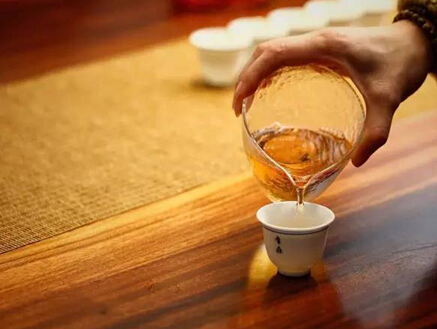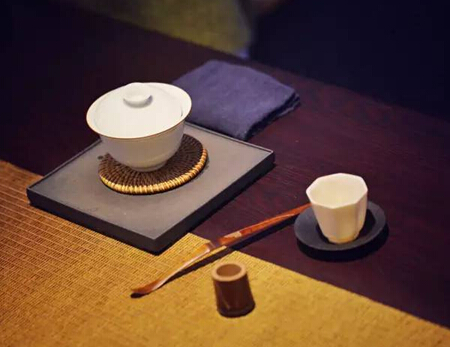
1. Tea-to-water ratio for brewing Rock Tea
Generally, a ratio of 1:20 is appropriate, meaning 1 gram of dry tea to 20ML of water. For example, a commonly used 120ML gaiwan requires about 6-7 grams of dry tea. Whether using a pot or a gaiwan, fill it with water to maintain temperature and facilitate skimming off tea foam. Pour the water from a height, often referred to as "suspending the pot and pouring high," to loosen the tea leaves and release their flavor.
2. Speed of pouring
The steeping time varies depending on the tea. For refined teas with high fire功,一般只要10-20秒左右,火功低者可略长。二三泡后可视个人口味依次延长浸泡时间。此外,可根据品种、条索粗细、口味浓淡灵活掌握。
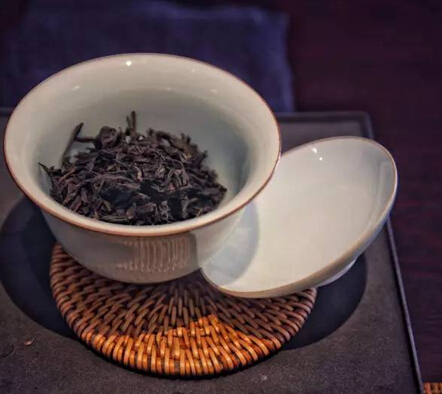
3. Three stages of observing color
These are the color of the dry tea, which is brown-green with a precious hue, with the best having three shades of brown, green, and red, and the finest being deep brown and oily; the color of the tea liquor, which is orange-yellow or golden-yellow, with higher fire功 or older teas being slightly darker, like orange-red; and the color of the brewed leaves, which are soft green with red edges or red spots.
4. Four sensations
The tea liquor is thick, smooth, and lubricating; the aroma is clear, upright, and distant; the sweetness returns quickly and noticeably; and the taste lingers for a long time.
5. Five stages of smelling the aroma
Smell the dry tea leaves, smell the steam aroma, smell the liquor aroma, smell the cup bottom after drinking, and smell the cold liquor and cold brewed leaves. The aroma of high-quality tea should be sharp and long-lasting if intense, or clear and distant if subtle, with a natural fragrant aroma. Persistence and purity of aroma are indicators of excellence.
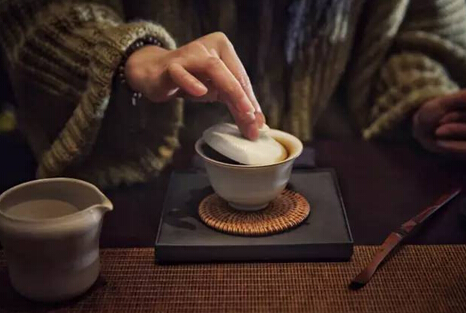
6. Six types of aroma
Fresh scent, clear floral scent, floral scent, floral-fruity scent, fruity scent, and characteristic scent.
7. Characteristic aromas of seven varieties
Shui Xian ≈ orchid scent; Rou Gui ≈ cinnamon scent; Wu Long ≈ peach scent; Fo Shou ≈ pear scent; Qi Lan ≈ almond scent; Shui Jin Gui ≈ wintersweet scent; Tie Luo Han ≈ herbal medicine scent. These are general descriptions, as variations occur due to growing location and processing techniques.
8. Appreciation
Wuyi Rock Tea "emphasizes tasting the water," so one must carefully perceive its flavor. When lifting the tasting cup, first observe its color, then smell its aroma, and then taste its flavor. Experienced tea drinkers often let the tea water enter the mouth, raise the tongue tip, and inhale to swirl the tea throughout the mouth. This is called "sipping," aiming to detect any bitterness or astringency, the extent and intensity of such sensations, and whether the tea is mellow, thick, sweet, and lively. Then swallow slowly to feel whether it is smooth, refreshing, and sweetly lively.
Appreciating Wuyi Rock Tea should not be done carelessly or distractedly. Tea is appreciated through tasting, and quality is compared. Besides careful sipping, one can compare the same type of tea or different types of tea. This helps distinguish the excellence of the same tea and appreciate the different styles of various teas, enhancing tasting memory. Tea Encyclopedia drinks many teas daily and keeps a tasting diary as a habit.
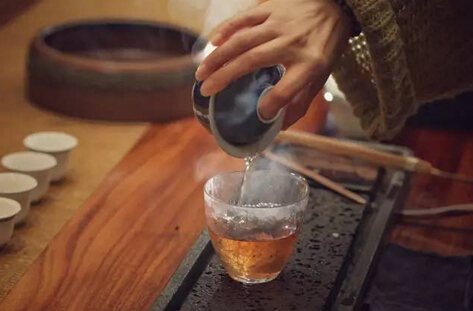
9. Rinsing tea
According to tea experts like Zhan Zijin and Wu Wennan, ripe aroma Oolong Tea does not need rinsing. The idea of rinsing tea implies it is unclean. In fact, Wuyi Rock Tea is fried at wok temperatures above 200 degrees Celsius and roasted at over 100 degrees Celsius, with full fire and slow roasting lasting many hours. It also undergoes wind selection and sieving, so uncleanliness is rare. Sometimes, to quickly release the flavor for tasting, the tea can be briefly soaked in hot water and then drained. This is often called "warming the tea" or "moistening the tea."
10. About the "essence" theory
Tea friends often hear at tea gatherings phrases like "the first brew is soup, the second brew is tea, the third and fourth brews are the essence." This statement is inadequate. Wuyi Rock Tea is known for its thick liquor, with the first brew extracting about 30% of its contents. However, the first and second brews contain more caffeine and polyphenols, making them slightly bitter and astringent. Good Rock Tea can be brewed at least seven or eight times, even over ten times. Tea enthusiasts often boil the tea after multiple brews in winter for drinking. How can the essence be limited to the third and fourth brews?
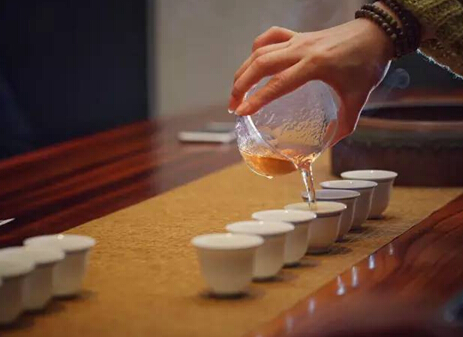
11. About the fairness cup and aroma cup
The fairness cup is mainly for evening out the tea liquor and facilitating serving. As for the aroma cup, it is for smelling the tea aroma. If one is skilled in brewing Rock Tea, these two utensils can be omitted, and it is recommended to do so. Rock Tea has a thick liquor and long aroma, and should be drunk at an appropriate temperature. Simply use "Guangong touring the city" and "Han Xin ordering troops" to evenly distribute the tea liquor into each cup.
Smelling the aroma can be done through the tasting cup. After drinking, smell the cold aroma at the bottom of the cup. This avoids overly cooling the tea liquor and reducing the aroma by using a fairness cup. It also simplifies the process without losing the tea connoisseur's elegance. Some may ask about tea residue or small leaves affecting the beauty of the liquor. This requires the brewer to be calm, as a calm mind results in clear liquor. Being calm when adding tea and removing broken leaves, and being calm and gentle when pouring, can reduce such situations.
12. Fragrance, clarity, sweetness, and liveliness
This concept was first mentioned by Liang Zhangju, a native of Changle who served as governor of Jiangsu and viceroy of Liangjiang during the Qing Dynasty. Liang retired due to illness and visited Wuyi Mountain several times. Once, while staying overnight at Tianyou Temple, he discussed tea with the Taoist priest Jing Can.
Jing Can categorized Wuyi Rock Tea into four grades. "The first is fragrance, which varieties like floral-scented small leaf types possess. Above that is clarity; fragrance without clarity is still ordinary. Above that is sweetness; fragrance without sweetness is bitter tea. Above that is liveliness; sweetness without liveliness is merely good tea. The word 'liveliness' must be discerned from the tongue."
This progressive grading is in line with the rules and is regarded as a classic by tea connoisseurs. However, many now write it as "liveliness, sweetness, fragrance, clarity," implying that "liveliness" is the best, which is a downgrading evaluation and does not conform to the procedure of evaluating and appreciating Wuyi Rock Tea.
